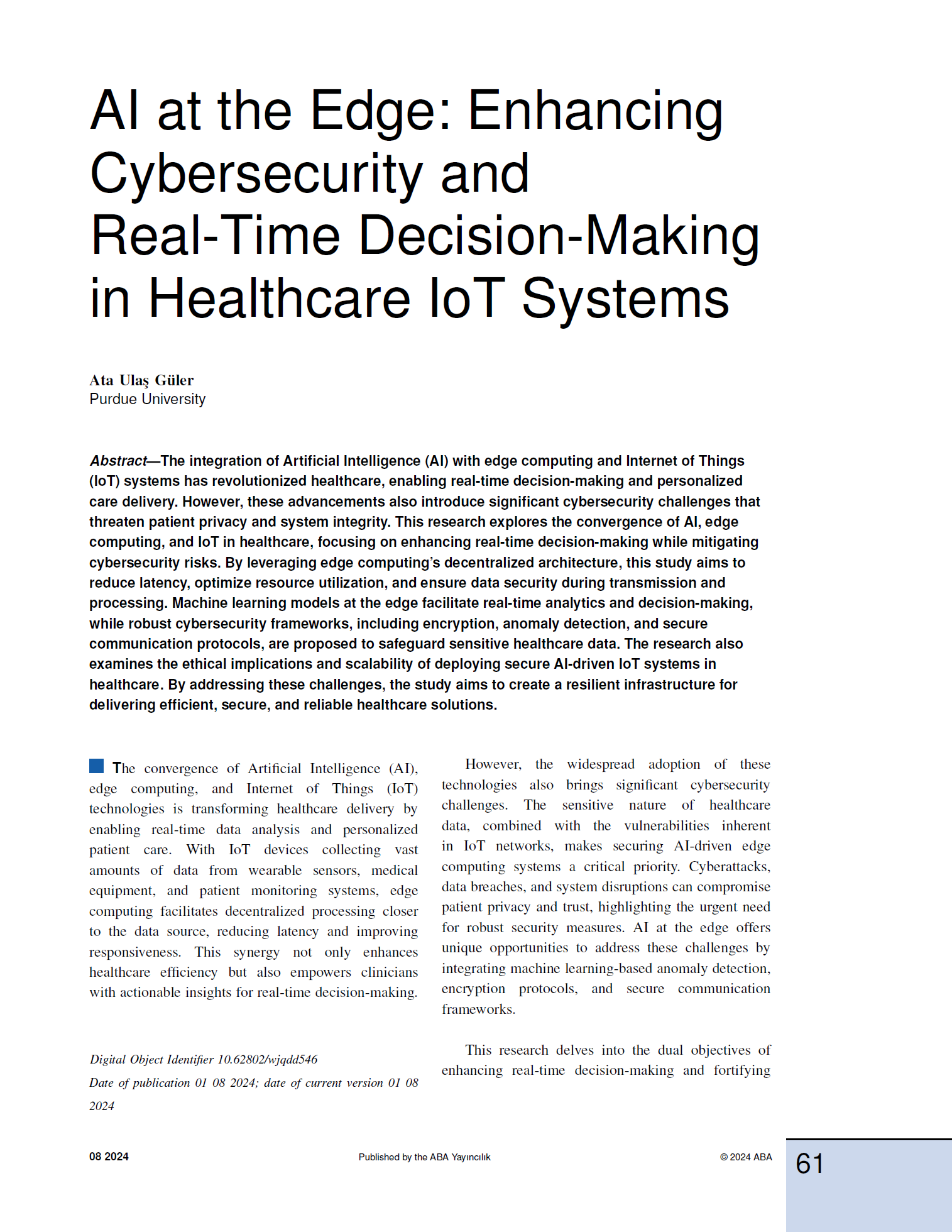AI at the Edge: Enhancing Cybersecurity and Real-Time Decision-Making in Healthcare IoT Systems
DOI:
https://doi.org/10.62802/azavq251Keywords:
Artificial Intelligence, edge computing, IoT, healthcare, cybersecurity, real-time decision-making, data privacy, machine learning, decentralized systems, healthcare analyticsAbstract
The integration of Artificial Intelligence (AI) with edge computing and Internet of Things (IoT) systems has revolutionized healthcare, enabling real-time decision-making and personalized care delivery. However, these advancements also introduce significant cybersecurity challenges that threaten patient privacy and system integrity. This research explores the convergence of AI, edge computing, and IoT in healthcare, focusing on enhancing real-time decision-making while mitigating cybersecurity risks. By leveraging edge computing’s decentralized architecture, this study aims to reduce latency, optimize resource utilization, and ensure data security during transmission and processing. Machine learning models at the edge facilitate real-time analytics and decision-making, while robust cybersecurity frameworks, including encryption, anomaly detection, and secure communication protocols, are proposed to safeguard sensitive healthcare data. The research also examines the ethical implications and scalability of deploying secure AI-driven IoT systems in healthcare. By addressing these challenges, the study aims to create a resilient infrastructure for delivering efficient, secure, and reliable healthcare solutions.
References
Banik, S., Kothamali, P. R., & Dandyala, S. S. M. (2024). Strengthening Cybersecurity in Edge Computing with Machine Learning. Revista de Inteligencia Artificial en Medicina, 15(1), 332-364.
Bhatia, M. (2024). An AI-enabled secure framework for enhanced elder healthcare. Engineering Applications of Artificial Intelligence, 131, 107831.
Cadet, E., Osundare, O. S., Ekpobimi, H. O., Samira, Z., & Wondaferew, Y. (2024). AI-powered threat detection in surveillance systems: A real-time data processing framework.
Gbaja, C. (2024). Next-Generation Edge Computing: Leveraging Ai-Driven Iot For Autonomous, Real-Time Decision Making And Cyber security. Journal of Artificial Intelligence General science (JAIGS) ISSN: 3006-4023, 5(1), 357-371.
Goriparthi, R. G. (2024). Reinforcement Learning in IoT: Enhancing Smart Device Autonomy through AI. International Journal of Advanced Engineering Technologies and Innovations, 2(1), 89-109.
Modupe, O. T., Otitoola, A. A., Oladapo, O. J., Abiona, O. O., Oyeniran, O. C., Adewusi, A. O., ... & Obijuru, A. (2024). Reviewing the transformational impact of edge computing on real-time data processing and analytics. Computer Science & IT Research Journal, 5(3), 693-702.
Putra, K. T., Arrayyan, A. Z., Hayati, N., Damarjati, C., Bakar, A., & Chen, H. C. (2024). A Review on the Application of Internet of Medical Things in Wearable Personal Health Monitoring: A Cloud-Edge Artificial Intelligence Approach. IEEE Access.
Rupanetti, D., & Kaabouch, N. (2024). Combining Edge Computing-Assisted Internet of Things Security with Artificial Intelligence: Applications, Challenges, and Opportunities. Applied Sciences, 14(16), 7104.
Singh, B., & Kaunert, C. (2024). Integration of cutting-edge technologies such as Internet of Things (IoT) and 5G in health monitoring systems: a comprehensive legal analysis and futuristic outcomes. GLS Law Journal, 6(1), 13-20.
Vargas, D., & Ortiz, I. (2024). Edge Computing with AI-Driven Decision Frameworks: Leveraging Artificial Intelligence for Real-Time Analytics, Scalability, and Autonomous Decision-Making in Distributed Systems. International Journal of Machine Intelligence for Smart Applications, 14(8), 69-91.


